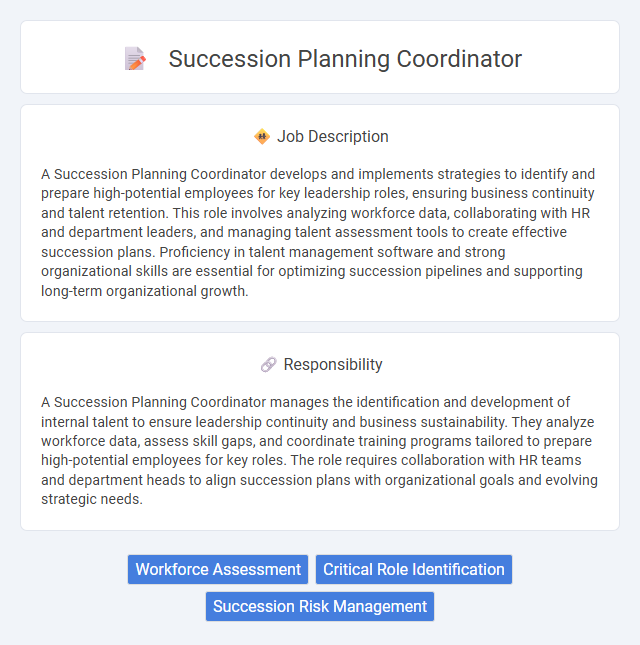
A Succession Planning Coordinator develops and implements strategies to identify and prepare high-potential employees for key leadership roles, ensuring business continuity and talent retention. This role involves analyzing workforce data, collaborating with HR and department leaders, and managing talent assessment tools to create effective succession plans. Proficiency in talent management software and strong organizational skills are essential for optimizing succession pipelines and supporting long-term organizational growth.
Individuals with strong organizational skills and a keen understanding of talent development are likely to excel as succession planning coordinators. Those comfortable navigating complex workforce dynamics and analyzing employee potential may find this role particularly suitable. Candidates lacking strategic thinking or interpersonal communication abilities might face challenges in fulfilling the job's responsibilities effectively.
Qualification
A Succession Planning Coordinator typically holds a bachelor's degree in human resources, business administration, or a related field, with certifications such as SHRM-CP or PHR preferred. Proven experience in talent management, organizational development, and data analysis supports effective identification and development of future leaders. Strong skills in communication, project management, and strategic planning are essential for coordinating succession initiatives aligned with company goals.
Responsibility
A Succession Planning Coordinator manages the identification and development of internal talent to ensure leadership continuity and business sustainability. They analyze workforce data, assess skill gaps, and coordinate training programs tailored to prepare high-potential employees for key roles. The role requires collaboration with HR teams and department heads to align succession plans with organizational goals and evolving strategic needs.
Benefit
Succession planning coordinator roles might significantly enhance organizational resilience by identifying and developing potential leaders. There is a strong probability that companies benefit from reduced turnover and smoother leadership transitions. Effective succession planning often leads to improved employee engagement and retention, fostering long-term business stability.
Challenge
The role of a Succession Planning Coordinator likely involves navigating complex organizational structures to identify high-potential candidates for key leadership positions. Challenges may arise in balancing diverse stakeholder expectations while ensuring alignment with company growth strategies and talent development goals. Handling sensitive employee data and fostering transparent communication could also be critical areas demanding careful management.
Career Advancement
A Succession Planning Coordinator plays a crucial role in identifying and developing internal talent to ensure seamless leadership transitions and organizational continuity. Expertise in talent assessment, employee development, and strategic workforce planning significantly enhances career advancement opportunities within human resources and organizational development fields. Mastery in succession planning tools and data analysis positions professionals for leadership roles in HR management and business strategy.
Key Terms
Workforce Assessment
A Succession Planning Coordinator specializes in conducting comprehensive workforce assessments to identify critical talent gaps and future leadership needs within an organization. They analyze employee skills, performance metrics, and potential to develop targeted development plans that align with strategic goals. This role ensures a pipeline of qualified candidates ready to fill key positions, mitigating risks associated with turnover and organizational change.
Critical Role Identification
Succession planning coordinators play a crucial role in identifying critical roles within an organization that are essential for sustaining business operations and long-term growth. They analyze organizational structure, evaluate job functions, and collaborate with leadership to pinpoint positions with high impact and potential talent gaps. This strategic focus enables seamless leadership transitions and minimizes disruptions to key business processes.
Succession Risk Management
Succession planning coordinators play a critical role in succession risk management by identifying key talent gaps and developing strategic plans to ensure leadership continuity. They analyze organizational data to predict turnover risks and implement targeted development programs that mitigate potential disruptions. Effective succession risk management enhances organizational resilience by preparing high-potential employees for future leadership roles.
 kuljobs.com
kuljobs.com